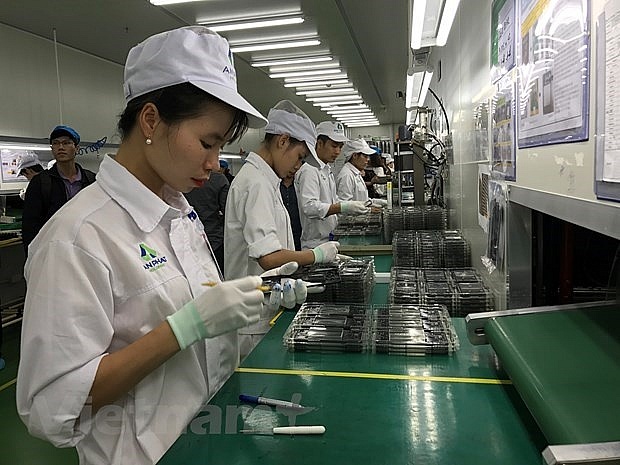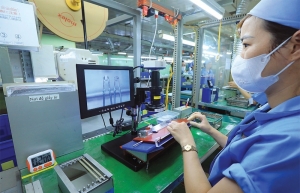Euro parliament steps up Vietnam’s IPA ratification
Bernd Lange, chairman of the European Parliament’s Committee on International Trade, last week had a meeting with trade ministers of EU member states, urging these nations to soon adopt the EU-Vietnam Investment Protection Agreement (EVIPA).
 |
| (Illustrative image. Source: VNA) |
“The ratification is too slow, making it difficult to increase the investment ties between both sides,” Lange told VIR in an interview during his working trip to Hanoi more than a week ago. “So far, 17 nations have passed the deal. We have held such a meeting every six months to review ratification.”
The EVIPA was approved in February 2020 and then ratified by the Vietnamese National Assembly in June of the same year. The agreement will enter into force when it is ratified by all EU member states. It includes protective clauses and dispute resolution mechanisms similar to those found in bilateral investment protection agreements between EU member states and non-EU countries.
“It would be unacceptable if the ratification process takes a long time. However, reality has shown that the ratification process of the similar agreements between the EU with Canada and Central America also took a very long time, at six and 11 years respectively, because of various reasons,” Lange said.
Julien Guerrier, Ambassador and Head of the European Delegation to Vietnam, said, “For some member states, the endorsement is more complicated as it involves wide consultations with parliamentary bodies at regional levels. Relevant services on the EU side have been trying their best to accelerate this process.”
It is also reported that barriers behind the slow ratification also include complicated procedures within these countries’ parliaments, such as those of Germany, France, Belgium, and the Netherlands, with some parties not supporting trade liberalisation as they want to protect domestic production.
For example, in Belgium, the agreement must be ratified by the nation’s six states independently. Germany and the Netherlands, meanwhile, already have bilateral investment protection agreements with Vietnam that currently remain valid, making it more complex to approve it.
“The EU hopes the EVIPA will boost investment in Vietnam, which is one of Asia’s fastest-growing economies and is also a gateway to the wider East Asia region. Vietnam is therefore a promising market, and relative to the size of its economy, it has attracted a very high rate of foreign investment,” said a statement from the European Parliament.
In many high-level talks with both EU leaders and many EU member states that have yet to ratify the deal, the leaders of the Vietnamese government and the Ministry of Foreign Affairs (MoFA) have highlighted the big need for the agreement to be passed as soon as possible.
During an official visit to Hungary over a week ago by Vietnam’s Prime Minister Pham Minh Chinh, Hungary’s PM Viktor Orban pledged to urge fellow EU nations to endorse the EVIPA during his country’s presidency of the EU Council in the second half of 2024. Also, while paying an official visit to Romania last week, PM Chinh also asked this nation to urge EU countries to soon adopt it. Hungary and Romania were among the first nations to approve the agreement.
During an official visit to Vietnam by Dutch Prime Minister Mark Rutte last November, PM Chinh suggested that the Netherlands soon ratify the agreement, and encourage Dutch firms to invest more in Vietnam in high technology, seaports, and strategic infrastructure.
PM Rutte agreed to speed up the ratification, spoke highly of Vietnam’s efforts to promote sustainable fisheries development, and pledged to work with other EU members to support Vietnam in the field.
MoFA Minister Bui Thanh Son said that the EVIPA aims to protect investors and financing in both Vietnam and the EU markets and ensures that they will be accorded fair treatment. “Vietnam wants to woo more EU investment, and it will serve as a protector of investors’ rights and benefits, in addition to our improved business climate,” Son said.
However, Lange also told VIR that currently investment from the EU keeps increasing even without the EVIPA, and thanks to the EU-Vietnam Free Trade Agreement.
“Full ratification will serve as a big impetus for the investment ties. However, what is also essential is that Vietnam must improve its business and investment climate, especially when it comes to administrative procedures, management, and licensing projects,” Lang said. “For example, currently many cumbersome and complicated procedures are making it difficult for EU wind and solar power plants to be licensed.”
Once taking effect, the EVIPA will “have many positive impacts” on Vietnam’s investment and business environment, according to the Vietnamese Ministry of Planning and Investment (MPI). Its study indicated that the agreement will “pressurise Vietnam to boost its economic renewal, with a more favourable business and investment climate to be created for EU investors and businesses”. Besides that, Vietnam will also be able to balance its investment attraction and protection of national interests and sustainable development.
Investment from the EU will be facilitated as the EVIPA will allow a rise in the bloc’s investment liberalisation into Vietnam, especially in a wide range of sectors such as finance, distribution, transportation, and telecommunications.
Data from the MPI indicates that the EU has a total stock of investment of about $28.3 billion, with around 2,450 projects.
Total trade between Vietnam and the EU is estimated to hit $59.1 billion last year, with the country’s export and import turnover of $44.1 billion and $15 billion, respectively.
| Modelled on the EU-Singapore Investment Protection Agreement, the EVIPA will replace the 20 existing bilateral investment agreements between Vietnam and 21 EU member states. The agreement includes a new investment court system, comprising an investment tribunal and appeal tribunal to resolve disputes between EU investors and Vietnamese authorities (and vice versa). The system aims to offer a high level of protection for EU investors in Vietnam, ensuring that they are not targeted by abusive treatment disadvantaging them relative to Vietnamese operators, and that their assets are not expropriated without adequate compensation. At the same time, the agreement confirms the right of governments to “achieve legitimate policy objectives, such as the protection of public health, safety, environment or public morals”. The EU-Vietnam Free Trade Agreement (EVFTA) and the EVIPA were initially negotiated as a single text, but in 2018 the EU and Vietnam decided to split them, following the approach chosen for the trade and investment agreements with Singapore. The EVFTA covers exclusive EU competences, and can therefore be ratified by the EU alone, without involving the member states. The EVIPA covers non-direct (portfolio) investment and investor-state dispute settlement mechanisms: these are shared competences, on which the EU shares decision-making powers with member states, meaning that the agreement must also be ratified by them. The two texts were signed by the EU and Vietnam in Hanoi in 2019. In 2020, the European Parliament gave its consent to both agreements, followed by the Vietnamese National Assembly in June of that year.Source: European Parliament |
 | Localities anticipate criteria framework to attract FDI Many localities are waiting for more specific criteria for the attraction of high-profile foreign-led initiatives. |
 | Domestic pharmaceutical products anticipate 2024 boost 2023 witnessed many fluctuations in the economy, with various industrial fields witnessing negative growth, but the pharmaceutical industry remains growing thanks to the breakthroughs of leading pharmaceutical companies. |
What the stars mean:
★ Poor ★ ★ Promising ★★★ Good ★★★★ Very good ★★★★★ Exceptional
 Tag:
Tag:
Related Contents
Latest News
More News
- Kurz Vietnam expands Gia Lai factory (February 27, 2026 | 16:37)
- SK Innovation-led consortium wins $2.3 billion LNG project in Nghe An (February 25, 2026 | 07:56)
- THACO opens $70 million manufacturing complex in Danang (February 25, 2026 | 07:54)
- Phu Quoc International Airport expansion approved to meet rising demand (February 24, 2026 | 10:00)
- Bac Giang International Logistics Centre faces land clearance barrier (February 24, 2026 | 08:00)
- Bright prospects abound in European investment (February 19, 2026 | 20:27)
- Internal strengths attest to commitment to progress (February 19, 2026 | 20:13)
- Vietnam, New Zealand seek level-up in ties (February 19, 2026 | 18:06)
- Untapped potential in relations with Indonesia (February 19, 2026 | 17:56)
- German strengths match Vietnamese aspirations (February 19, 2026 | 17:40)






















 Mobile Version
Mobile Version